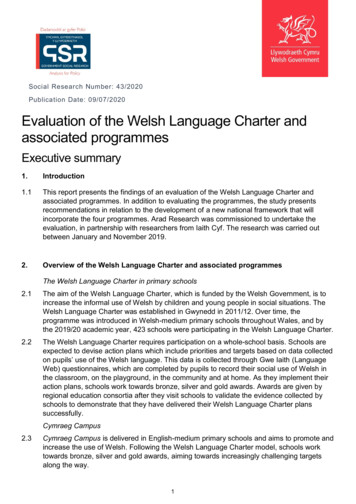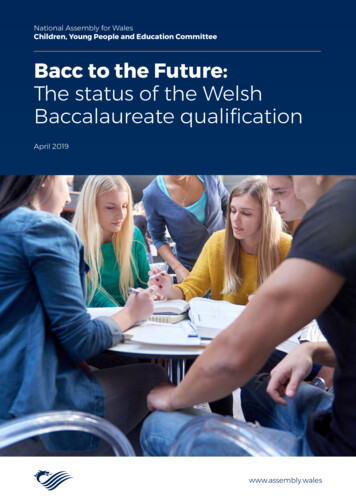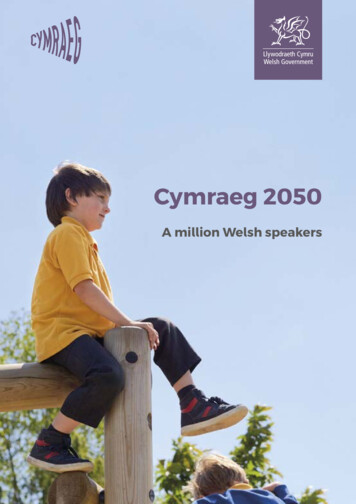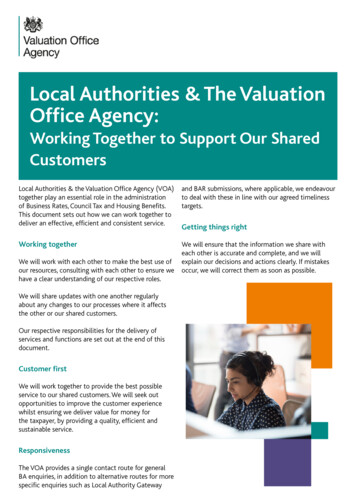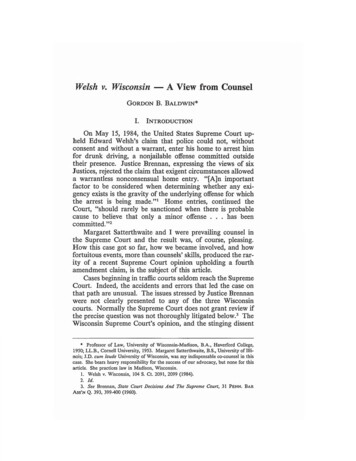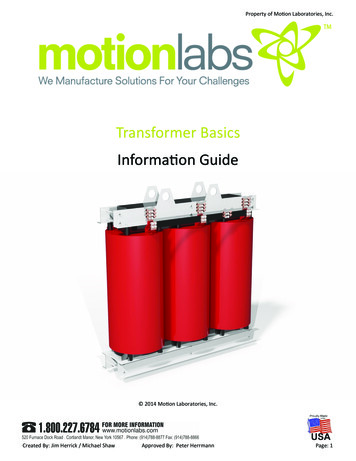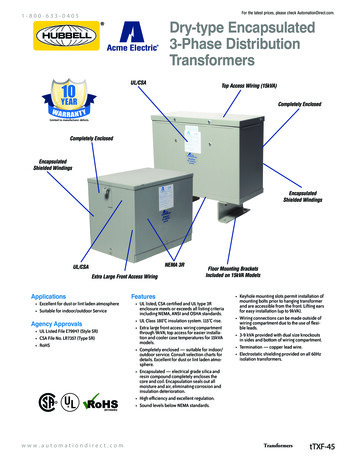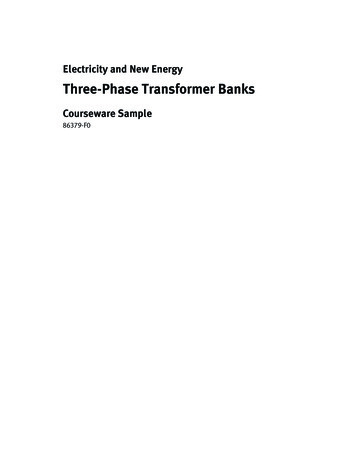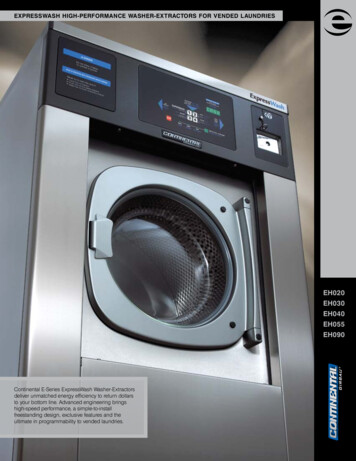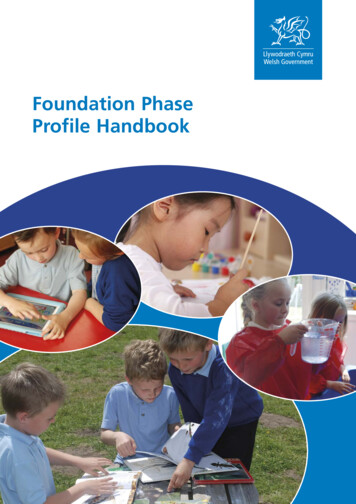
Transcription
Foundation PhaseProfile Handbook
Foundation Phase Profile HandbookAudienceHeadteachers, teachers, practitioners, governing bodies of maintained schools andpractitioners and management committees in the non-maintained sector in Wales;local education authorities; teacher unions and school representative bodies;church diocesan authorities, national bodies in Wales with an interest in educationand parents/carers.OverviewThis document sets out the Welsh Government’s requirements as part of the EarlyYears Development and Assessment Framework (EYDAF) and supports assessmentof children’s learning and development throughout their time in the FoundationPhase.Action requiredHeadteachers, teachers, practitioners, governing bodies of maintained schoolsand practitioners and management committees in the non-maintained sector inWales must ensure that the statutory requirements set out in this document areimplemented in line with the date specified.Further informationEnquiries about this document should be directed to:Early Years TeamDepartment for Education and SkillsWelsh GovernmentCathays ParkCardiffCF10 3NQe-mail: earlyyears@wales.gsi.gov.ukAdditional copiesThis document can be accessed from the Learning Wales website atlearning.gov.walesRelated documentsCurriculum for Wales: Foundation Phase Framework rshome/foundation-phase/?lang enMae’r ddogfen yma hefyd ar gael yn Gymraeg.This document is also available in Welsh. Crown copyright September 2017WG32346Digital ISBN 978 1 78859 477 6
ContentsIntroduction3The Foundation Phase Profile4Using the Foundation Phase Profile5Observation and assessment10Child development13Personal and Social Development, Well-being and Cultural Diversity15Social interaction (Compact Profile)16Behavioural regulation (Compact Profile)18Response to others (Compact Profile)20Independence in personal care (Compact Profile)22Engagement24Emotional expression26Personal and Social Development, Well-being and Cultural Diversity glossary28Language, Literacy and Communication Skills29Oracy – Listening and understanding (Compact Profile)30Oracy – Phonological awareness (Compact Profile)32Oracy – Expressive language (Compact Profile)34Reading – Understanding reading materials (Compact Profile)36Oracy – Collaboration and presenting information and ideas38Oracy – Speech40Oracy – Talking and play42Reading – Comprehension44Reading – Reading words46Writing – Handwriting48Writing – Spelling50Writing – Punctuation and grammar52Writing – Genre54Writing – Planning, evaluating and editing56Language, Literacy and Communication Skills glossary57
Mathematical Development59Reciting and sequencing numbers (Compact Profile)60Counting (Compact Profile)61Shape (Compact Profile)62Pattern (Compact Profile)64Reading and writing numbers65Properties of number66Fractions67Measures and units68Time70Data recording and representation72Data sorting and grouping74Addition and subtraction76Managing money78Multiplication and division79Temperature80Angle and position81Estimating and checking82Mathematical Development glossary83Physical Development85Holding a mark-making implement (Compact Profile)86Coordinated movement (Compact Profile)88Drawing (Compact Profile)90Fine manipulation (Compact Profile)94Using scissors and tools96Improving performance98Physical Development glossary99Annex A: Skill ladders from the Compact Profile100Annex B: Using the Record Form101Annex C: The Compact Profile Form102Annex D: The Full Profile Form104
IntroductionPurpose of the Foundation Phase ProfileAs a key part of the Welsh Government’s Early Years Development and AssessmentFramework (EYDAF), the Foundation Phase Profile (the profile) supports assessment ofchildren’s learning and development throughout their time in the Foundation Phase. Its mainpurpose is to provide a nationally consistent baseline assessment which aligns with end ofphase outcomes. Through the use of observations and formative assessments, the profilesupports practitioners to provide a developmentally appropriate holistic curriculum for allchildren.The profile has been designed to line up with assessments carried out by health professionalsand also supports early identification of possible developmental delay, special educationalneeds (SEN), or additional learning needs (ALN); this will ensure support is given to childrenwho need it. The assessments gathered as part of the profile will provide useful informationfor all stakeholders in children’s learning and development, supporting transitions betweensettings and schools.Profile structureThe profile is made up of two sets of skills ladders in four Areas of Learning: Personaland Social Development, Well-being and Cultural Diversity, Language, Literacy andCommunication Skills, Mathematical Development and Physical Development. The CompactProfile contains a select number of skill ladders for use at baseline and a Full Profile supportingend of phase teacher assessments. As well as supporting summative assessments at statutorypoints, the profile provides a nationally consistent method for scoring the Foundation Phaseoutcomes and progress data.The outcomes detailed in the profile reflect the skills expressed in the revised Areas ofLearning (to incorporate the National Literacy and Numeracy Framework (LNF) for Language,Literacy and Communication Skills and Mathematical Development (statutory fromSeptember 2015) and those for Personal and Social Development, Well-being and CulturalDiversity and Physical Development (published in 2008). It covers children’s development fromsix to eighty-four months and introduces three new early steps within the outcomes: Bronze,Silver and Gold.Involving parents/carers in their children’s education is an essential part of the FoundationPhase pedagogy. The profile also supports communicating with and reporting to parentsand carers, drawing together a wide range of information to provide summative judgmentson their child’s current stage of learning and development, including reporting those skillsexpressed in the LNF.Foundation Phase Profile 3
The Foundation Phase ProfileThe Foundation Phase Profile consists of the following elements. Handbook – The Handbook provides guidance on using the profile and details all the skillladders included within it along with supporting information. Record Form – The Record Form is an optional element of the Foundation Phase Profiledesigned to be used by those who do not use software-based systems. The Record Formsprovide a consistent structure to detail evidence of children’s development. Compact Profile Form – The Compact Profile Form produces a snapshot of a child’sdevelopment on the Foundation Phase Profile at or before the baseline assessment. Itallows practitioners to produce a single outcome for each Area of Learning in the profile. Full Profile Form – The Full Profile Form produces a snapshot of a child’s developmentusing all the skill ladders within the Foundation Phase Profile. It allows practitioners toproduce a single outcome for each Area of Learning, on a consistent scale aligning withthe Compact Profile.The profile summatively assesses children’s skills using observations and formative assessmentsand produces outcomes expressed in four Areas of Learning. Skills should be observed acrossa wide range of experiences and all the Foundation Phase Areas of Learning. The Areas ofLearning within the profile are: Personal and Social Development, Well-Being and Cultural Diversity Language, Literacy and Communication Skills – revised to include the literacy componentof the LNF Mathematical Development – revised to include the numeracy component of the LNF Physical Development.4 Foundation Phase Profile
Using the Foundation Phase ProfileJoining a new setting or school can be a challenging time for children and it is important thattheir needs are considered when carrying out assessments. As the profile supports trackingchildren’s progress throughout their time in the Foundation Phase it can be used in a nurserysetting or school from age three, at baseline in Reception and through to the end of Phase inYear 2. Assessments derived from the Compact Profile and the Full Profile are comparable asthey are based upon the same outcomes scale.On entry to the Foundation PhaseThe profile’s skill ladders support assessment of skills of very young children and those whoare in the very early stages of their development. This makes the profile suitable for use insettings and nurseries and forms an important part of recording children’s achievements fromtheir entry into the Foundation Phase. As well as providing important details at transition,using the profile will support practitioners in planning the next steps in learning and alsodifferentiation within setting or small school.The Compact Profile – BaselineRecognising that young children need time to settle into a new class, unobtrusiveobservations should be made over the first six weeks following their entry into Reception classto form a baseline assessment. To complete a baseline assessment practitioners are requiredto assess children using the Compact Profile, a select number of skill ladders from each of thefour Areas of Learning. The skill ladders were chosen for baseline assessment on the groundsthat they are easy to observe within the first half term and that they provide key informationabout children for supporting their early development.An observational baseline, rather than a series of tests, provides a wide range of evidenceon which to form assessment judgments. This approach supports the Foundation Phasepedagogy helping practitioners to understand children’s learning styles and interests as well astheir developmental stages. The outcomes produced through using the Compact Profile willbe reported to the Welsh Government. Details of statutory reporting arrangements can befound on the Welsh Government website and Learning Wales.The Full ProfileThis version of the profile includes all the skill ladders for each Area of Learning in the profile.The Full Profile may be used to establish the end of phase outcomes at the end of Year 2. Theprofile may also be used if a fuller picture of progress is desired.Foundation Phase Profile 5
The Foundation Phase Profile skill laddersThe skill ladders included within the Foundation Phase Profile are shown below. Skill laddersthat are bold are included in the Compact Profile.Personal and Social Development, Well-being and Cultural DiversitySocial l expressionResponse to othersIndependence inpersonal careLanguage, Literacy and Communication SkillsOracy –Listening andunderstandingOracy –PhonologicalawarenessOracy –ExpressivelanguageReading –Understandingreading materialsOracy – Collaborationand presentinginformation and ideasOracy – SpeechOracy – Talking and playReading –ComprehensionReading – ReadingwordsWriting – HandwritingWriting – SpellingWriting – Punctuationand grammarWriting – GenreWriting – Planning,evaluating and editingMathematical DevelopmentReciting andsequencing numbersCountingShapePatternReading and writingnumbersProperties of numberFractionsMeasures and unitsTimeData recording andrepresentationData sorting andgroupingAddition and subtractionManaging moneyMultiplication anddivisionTemperatureAngle and positionEstimating and checkingPhysical Development6Holding amark-makingimplementCoordinatedmovementUsing scissors and toolsImproving performance Foundation Phase ProfileDrawingFine manipulation
Supporting the baseline assessmentThe following diagram supports the process of carrying out the baseline assessment.ReviewInformation already available from: previous practitioners and settings,health professionals, parents/carers, and the child.PlanContinuous, enhanced and focused provision for first six weeks in Reception classconsidering the skill ladders to be assessed. Plan appropriate opportunities in orderto observe skills within the Compact Profile.Do(Within the first six weeks of the child’s Reception year.)Implement plans through continuous, enhanced and focused provision.Record observations.Assess(Within the first six weeks of the child’s Reception year.)Summative assessment using skill ladders across the four Areas of Learning – based onpractitioners’ recorded observations over the six weeks (only).Use software or the Compact Profile Form to score outcomes for each skill ladder.ReviewOutcomes for each skill ladder and Area of Learning.Consider a need for further observation and assessment. Seek advice from specialeducational needs coordinator (SENCo) or additional learning needscoordinator (ALNCo) where necessary.Ask ’What does this mean for practice and provision?’PlanDevelopmentally appropriate continuous, enhanced and focused provisionbased on the children’s interests, lines of enquiry and learning styles.Foundation Phase Profile 7
Evidencing and recording judgmentsEvidence of children’s skills within the profile should be sourced across all Areas of Learning. Thereis no set method of recording observations for the Foundation Phase Profile. Further guidance onobservation in the Foundation Phase can be found on the Learning Wales website. The optionalRecord Form is provided to record notes that support the practitioners’ judgments for each skillladder.Settings and schools may use their own recording mechanisms to collate evidence andpractitioners must be confident and secure in their assessment of children’s independentabilities, drawing on a range of evidence to support their judgments. All practitioners shouldcontribute to the observation and assessment process.Estyn advise that they have no view on the exact amount of assessment evidence required asit is for individual settings and schools to decide how much evidence they will need to supportthe profile and the moderation of their judgments about an individual child. Inspectors willfocus their attention on the accuracy of the assessments and how the setting or school usesthe assessment information to support learners. During an inspection, inspectors will sampleindividual profiles, scrutinise children’s work and talk to children to check the accuracy of thesetting’s or school’s assessments.For further support on observation and assessment, including the statutory requirements inthe Foundation Phase, please visit the Learning Wales website.The National Literacy and Numeracy FrameworkThe National Literacy and Numeracy Framework (LNF) became a statutory curriculumrequirement for schools in September 2013 and for settings in September 2015. The LNFhas been introduced to raise standards in children’s literacy and numeracy skills by helping allpractitioners to: develop literacy and numeracy skills throughout the Foundation Phase Areas of Learning integrate literacy and numeracy into continuous, enhanced and focused provision, indoorsand outdoors inform discussions with parents/carers, children and other stakeholders help children with their own self-assessments monitor, assess and report on individual children’s performance identify children who may benefit from additional support.Formative assessment using the LNF is a statutory requirement and practitioners are requiredto assess children’s literacy and numeracy across the curriculum using the LNF. Annuallyschools will need to produce a narrative report to parents/carers on their child’s progress andtheir next steps in learning based on these assessments. The profile aligns with this process asthe formative assessments of LNF carried out over the year will inform the profile.8 Foundation Phase Profile
Reporting to parents/carersInformation gathered on the profile should be used to inform parents/carers of their child’sprogress. This can be through statutory annual reports, parents’/carers’ evenings and moreinformal discussions about their progress. There is no requirement to produce a written reportto parents/carers based on the baseline assessment.Language of assessmentChildren should be assessed on the profile in the language of the setting or school.Assessments for the Language, Literacy and Communication Skills and MathematicalDevelopment Areas of Learning should therefore only be carried out in English or Welsh.For the Personal and Social Development, Well-being and Cultural Diversity and PhysicalDevelopment Areas of Learning the skills should be the focus of the assessment.An example of this would be two children playing together in their home language (notEnglish or Welsh), who often play cooperatively together and with other children. They wouldbe awarded Foundation Phase Outcome 3 on the social interaction skill ladder, however theywould be marked lower on the Language Literacy and Communication Skills skill ladderswith this evidence. Those children should be given additional opportunities to demonstratetheir skills for the Language Literacy and Communication Skills outcome assessments in thelanguage of the setting or school.Special educational needs (SEN) and additional learningneeds (ALN)The Foundation Phase Profile has been designed to be suitable for all children and support theidentification of potential special educational needs (SEN) or additional learning needs (ALN).However, it is not the intention that the profile will have sufficient detail to fully assess SEN orALN children. While the lower steps support very early stages in children’s development theyreflect developmental norms and emergent skills.Practitioners may need to use appropriate assessments designed for specific purposes aswell as seek advice from additional learning needs coordinators (ALNCo) or appropriateprofessionals with the support and permission of the parents and carers. The WelshGovernment’s Routes for Learning (2006) can also be used to provide more detailedinformation for children with ALN as the skill descriptors support assessment and appropriatecurriculum planning.Foundation Phase Profile 9
Observation and assessmentThe Foundation Phase Profile has been developed as a summative assessment toolusing observations and formative assessments to build up a holistic picture of children’sdevelopment and abilities in key areas.ObservationObservation plays a key role in the everyday practice in the Foundation Phase. The mainpurposes of observing children are to determine where they are on the learning continuumin order to progress them, and to identify any difficulties or exceptional ability. Throughobserving and listening, practitioners are able to gather evidence before and after childrenhave been taught skills and over a period of time. This enables practitioners to assess howmuch progress the children have made and whether they need further opportunities toconsolidate their learning.In order to build a picture of the whole child it is important that observations are made inboth the indoor and outdoor environments. It is well documented that children may behaveand learn differently outdoors and it is important to reflect this in the assessment process.Observation of particular skills will not usually require specific activities to be set up: skillladders have been devised to represent what can normally be observed through a mixtureof child-led and practitioner-led activities and across continuous, enhanced and focusedprovision, indoors and outdoors.Where appropriate, children should be encouraged to understand and appreciate thedevelopment of their skills and given the opportunity to share their thoughts and feelings onhow they are progressing across different tasks and activities. Provision should be plannedcarefully to ensure developmentally appropriate activities and resources scaffold children’slearning and development.Discussion of activities before, during and after helps children reflect on their own abilities.Engagement with parents/carers is also key to gaining a whole picture of a child’s abilities, aswell as encouraging parent/carer engagement with their child’s education.Formative assessmentIn order that formative assessment is useful it is necessary to focus on children’s achievementsagainst skills in the curriculum and details of how they can move forward, rather thanfocusing on Foundation Phase outcomes. This will involve practitioners and childrenunderstanding specific skills and, if appropriate, the associated success criteria. In this waypractitioners can establish each child’s current position, set and plan for steps within skills andrecognise when they have been reached. Planning should support individual children workingtowards mastering specific skills across a broad and balanced curriculum rather than linkingdirectly to outcomes as these describe attainment over a range of tasks at baseline and theend of the Foundation Phase.10 Foundation Phase Profile
Good observational and formative assessment practice will support children in following theirinterests and extending what they excel at, as well as encouraging further development inareas where the child struggles or shows a lack of interest. Summative assessment shouldconsider the steps the child has made independently to achieve the skill and the confidenceand range of contexts in which they have performed it.Summative assessmentFoundation Phase outcomes have been developed for summative assessment of learning atbaseline and at the end of the Foundation Phase. They describe the type and range of attainmentthat children working at a particular outcome should characteristically demonstrate. They refer tochildren’s development over time and over a range of evidence of achievement (observations andformative assessments), providing a holistic view of a number of different skills.Foundation Phase outcomes are not designed for day-to-day use. A single observation or piece ofwork by the child should not be levelled against an outcome as it cannot provide the informationneeded to make a judgment, although it may demonstrate characteristics of a particular outcome.Using the Foundation Phase Profile for summative assessmentTo summatively assess each Area of Learning in the profile, practitioners should draw on arange of evidence to establish and record the developmental level of children in a series ofskill ladders. Practitioners can then produce an outcome score for each Area of Learning inthe profile using a consistent scoring method. By assessing on a skill-by-skill basis, not onlycan practitioners produce a summative score for each child’s current outcome but they canalso use the information to inform future learning. Each step on a skill ladder is accompaniedby a guidance statement to help practitioners reach their judgments and support consistencybetween them. Where possible, there is one statement per outcome on each skill ladder.Where there is more than one statement for an outcome, each statement should be takeninto account before an outcome can be awarded for that skill ladder.Scoring the assessmentThe valid outcomes that can be achieved for each Area of Learning are: Foundation PhaseOutcome Bronze; Foundation Phase Outcome Silver; Foundation Phase Outcome Gold;Foundation Phase Outcome 1; Foundation Phase Outcome 2; Foundation Phase Outcome 3;Foundation Phase Outcome 4; Foundation Phase Outcome 5; Foundation Phase Outcome 6;Above Foundation Phase Outcome 6; Disapplied; and Not Assessed.The outcomes Bronze to Above Foundation Phase Outcome 6 are based on a numericalscoring system, allowing practitioners to measure progress. The scoring system is designed sothat a child is awarded an outcome for an Area of Learning when approximately 75 per centof the skill ladders within the Area of Learning are achieved at that outcome. For example,to achieve Foundation Phase Outcome 1 in the baseline assessment, three of the four skillladders should be Foundation Phase Outcome 1 or higher.The scoring method is detailed further in Annex C.Foundation Phase Profile 11
DisapplicationOnly in very rare circumstances will there be a need to disapply a child. For the baselineassessment, it should be noted that a child can be disapplied for one skill ladder and stillreceive an outcome for the Area of Learning. However, if more than one skill ladder isdisapplied, the outcome of the Area of Learning is disapplied.For further information when a skill ladder should be disapplied, please seek guidance in theStatutory assessment arrangements for the Foundation Phase and end of Key Stages 2 and 3.Aligning outcomes to expected agesThe outcomes can be broadly aligned with the expected ages of development. These arelisted below.Expected age of developmentRelated outcome6–12 monthsFoundation Phase Outcome Bronze12–18 monthsFoundation Phase Outcome Silver18–24 monthsFoundation Phase Outcome Gold24–36 monthsFoundation Phase Outcome 136–48 monthsFoundation Phase Outcome 248–60 monthsFoundation Phase Outcome 360–72 monthsFoundation Phase Outcome 472–84 monthsFoundation Phase Outcome 584–96 monthsFoundation Phase Outcome 612 Foundation Phase Profile
Child developmentDuring the Foundation Phase children are rapidly acquiring new skills. They acquire these skillsat different rates and must be encouraged to develop at their own unique, individual pace.They develop a sense of their own identity and have increasing capacities for language andenquiry. Children require a wide range of experiences both to support their emotional, social,intellectual and physical development, and to help them make sense of their own immediateworld and the wider world around them.Throughout the Foundation Phase children must have an increasing ability to plan andmonitor their own activities in order to develop awareness of themselves as learners. Theylearn in their own way and the direction, speed of learning and growth will fluctuate fromday to day. As children learn new skills they should be given opportunities to practise them indifferent situations, across all Areas of Learning, and to reflect on, evaluate and consolidatetheir learning.All aspects of child development are important and should be considered as interlinked.Account also needs to be taken of barriers to play, learning and participation caused byphysical, sensory, emotional, communication or learning difficulties.The experiences that the children have had before entering the setting/school need to berecognised and considered. It is essential that children have access to a variety of mediain order to express themselves creatively, and also have ample opportunities to applytheir imagination in a purposeful way. As children learn new skills they should be givenopportunities to plan their learning, practise their skills and transfer them to differentsituations across all Areas of Learning, as well as opportunities to reflect on and evaluate theirlearning. In all aspects of their development, children’s own work should be respected, valuedand encouraged for its originality and honesty.To support their different developmental stages throughout the Foundation Phase childrenneed: practitioners and environments (indoors and outdoors) that support and challenge theirwidening interests and encourage them to develop their thinking and problem-solving skills practitioners who observe, assess and plan carefully for their developmental needs andinterests and include them in this process practitioners who encourage and extend conversations practitioners who provide good role models opportunities that support their development as independent, confident learners opportunities to work collaboratively opportunities to follow routine and unfamiliar activities, as well as opportunities to beinvolved in new and challenging tasksFoundation Phase Profile 13
opportunities to be creative through access to a variety of media that allows them toexpress themselves and apply their imagination in a purposeful way opportunities to work cooperatively with their peers and to have time to sustain theirinterest in activities opportunities to keep pace with and challenge their physical coordination anddevelopment.14 Foundation Phase Profile
Personal and Social Development,Well-being and Cultural DiversityPersonal and Social Development, Well-being and Cultural Diversity is at the heart of theFoundation Phase and children’s skills are developed across all Areas of Learning throughparticipation in experiential learning activities indoors and outdoors.Within this Area of Learning children learn about themselves, their relationships with otherchildren and adults both within and beyond the family. They are encouraged to developtheir self-esteem, their personal beliefs and moral values and an understanding that othershave differing needs, abilities, beliefs and views. The Foundation Phase supports the culturalidentity of all children, to celebrate different cultures and help children recognise and gain apositive awareness of their own and other cultures. Positive attitudes should be developed toenable children to become increasingly aware of, and appreciate the value of, the diversity ofcultures and languages that exist in a multicultural Wales. They should become increasinglyaware of the traditions and celebrations that are important aspects of the cultures withinWales.Motivation and commitment to learning is encouraged, as children begin to understand theirown potential and capabilities. Children are supported in becoming confident, competentand independent thinkers and learners. They develop an awareness of their environment andlearn about the diversity of people who live and work there. Positive attitudes for enjoyingand caring for their environment are fostered. As their self-identity develops, children beginto express their feelings and to empathise with others. They experience challenges that extendtheir learning.Further details of the skills and range for this Area of Learning can be found in Curriculum forWales: Foundation Phase Framework (2015).Skill ladders i
4 Foundation Phase Profile The Foundation Phase Profile consists of the following elements. Handbook - The Handbook provides guidance on using the profile and details all the skill ladders included within it along with supporting information. Record Form - The Record Form is an optional element of the Foundation Phase Profile
